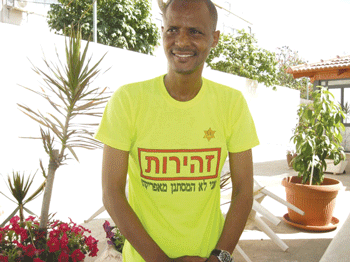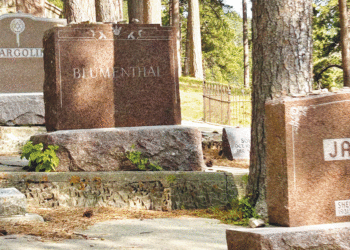At the end of a Knesset hearing in late May, Yulia Shamalov Berkovich, who represents the Kadima Party, said: “All human rights activists should be imprisoned and transported to the camps we are building” — a reference to a detention camp being constructed to hold African migrants. According to a report in the online 972 Magazine, she referred to Israelis aiding African refugees as “hypocrites” who are inciting Jews to violence.
In fact, there were pogrom-like riots targeting African migrants in the south Tel Aviv neighborhoods of Hatikva and Shapira last month. Right-wing Knesset members stirred up a large crowd (Miri Regev, a Likud member of the Knesset, called the Sudanese a “cancer in our body”), which went on a rampage, attacking Africans and African-owned businesses. According to a number of accounts on 972 Magazine, police intervened to save two journalists targeted by the mob, and generally tamped down even worse violence.
An estimated 60,000 Sudanese and Eritrean refugees have crossed the Egyptian Sinai border with Israel, and many of them are concentrated among poor Jews in south Tel Aviv. Some Jewish Israelis accuse the Africans of perpetrating rapes and other crimes.
The violence continued this week, with an arson attack on Eritreans in a Jerusalem apartment. Haaretz reported that four Eritrean migrant workers were injured in the attack, in which graffiti reading “leave the neighborhood” was found at the scene. A Jerusalem police unit is investigating the incident.

Elias Inbram wears a shirt he made that features a yellow star and reads: “CAUTION — I am not an infiltrator from Africa!” (Photo: JTA)
As for the demagoguery problem, the Times of Israel reported that Public Security Minister Yitzhak Aharonovitch warned Monday that statements made by public officials denigrating African migrants may lead to “severe violence.” In a ceremony commemorating fallen police officers at the Kiryat Ono Police Academy, Aharonovitch said “those who do so are covering up for years of inaction by joining the populist anti-migrant wave.” The government minister’s comments came on the same day as the arson attack on Jaffa Street.
JTA sent a story this week that reports on a tangent to the upsurge of anti-African violence in Israel: Ethiopian Jews are being targeted for racist attacks, on the assumption that they are African “infiltrators” into Israel. We didn’t have space to run the story in this edition (you can read it here); but it points to the explicitly racist nature of recent protests.
Eeta Prince-Gibson wrote about Elias Inbram, “a social activist in the Ethiopian community and a former member of the Israeli diplomatic corps who served as spokesman for the embassy in South Africa,” who designed a T-shirt for the protection of Ethiopian Jews. The silk-screened message reads: “CAUTION: I am not an infiltrator from Africa” on a bright yellow T-shirt. Inbram also drew in by hand, in the upper left corner, the unmistakable yellow “Jude” patch, which European Jews were forced to wear during the Holocaust.
Inbram, 38, reasoned “that since to white people, all blacks look the same — I, an Israeli Jew who is black, or anyone in my family, or anyone in my community, could be attacked, too.”
His T-shirt protest touched on both the current wave of violence against African migrants and simmering discontent among Ethiopian Jews.
“I have a law degree and a master’s degree. I served in the army,” Inbram told JTA. “Another friend of mine who was beaten up is a Ph.D. candidate. We’re Israeli citizens. But none of that matters. Ever since we came, the state has treated us as if we should say thank you for anything we receive, as if we have no rights as Jews and Israelis. But now we are afraid because in the eyes of whites, we are first of all blacks.”
Prince-Gibson’s story also noted: “Inbram was a member of the Foreign Ministry’s committee that deals with asylum seekers and said he feels no particular affinity or commonality with the migrant workers. He said he hesitated before adding the Nazi badge to his shirt. But then he thought: ‘We Jews and Israelis are very quick to condemn anti-Semitic attacks — like the ones near Lyon in France just this week. But the same thing is happening in our own country. Instead of being a “light unto the nations,” we behave worse than many of the countries we criticize. Germany has much more humane policies toward migrants and asylum seekers than Israel has. We should be doing some serious soul-searching.’”
The Tuesday edition of the New York Times reported on the arson attack in Jerusalem, and mentioned that Israel, in addition to erecting a 16-foot-tall fence on the border with Egypt and building a detention camp to hold 10,000 illegal immigrants, is determined to return migrants to their home nations. However, the story explains that those arriving in Israel from Sudan and Eritrea could be “at mortal risk” if they were repatriated. In view of that fact, “they are afforded blanket protection in Israel, in line with international conventions.”
The Times story also quoted Israel’s interior minister, Eli Yishai, a member of the ultra-Orthodox Shas Party, who declared that the Africans threaten to “bring us to the end of the Zionist dream.” In an interview with the Israeli newspaper Maariv, Yishai said: “Most of those people arriving here are Muslims who think the country doesn’t belong to us, the white man.”
That last statement clearly points to the endemic racism in Israeli society, which also has a significant problem in dealing humanely with thousands of African immigrants who have no legal status in the Jewish state. Jews, in Israel and the Diaspora, should join with the thousands of Israelis who demonstrated this past Saturday against the racist and violent protests that targeted African migrants. JTA reported that thousands of people demonstrated in Tel Aviv, banging on pots and pans, under a banner that read: “All of the country out in the streets — bringing back hope and justice.” This reflects the high ethical standards of our prophetic tradition, which, among other things, reminds us to deal kindly with the stranger, because we were once strangers in the land of Egypt.
— Mordecai Specktor / editor@ajwnews.com
(American Jewish World, 6.8.12)



















